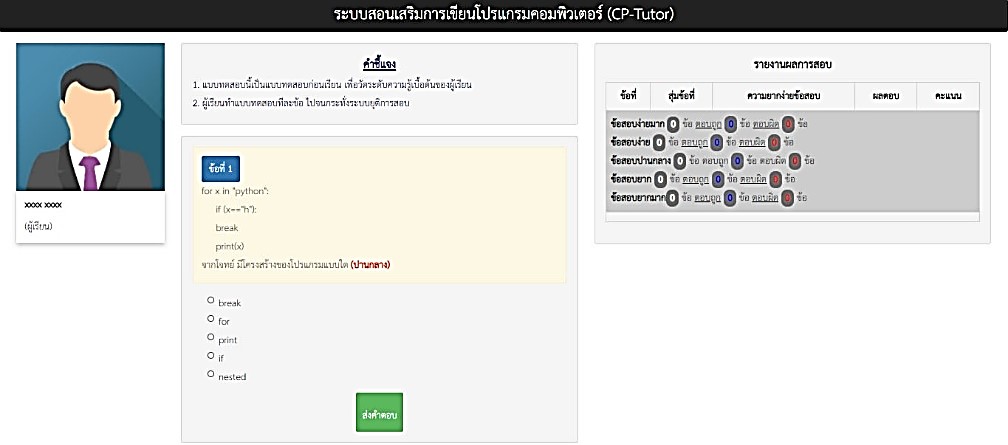การพัฒนาระบบสอนเสริมอัจฉริยะบนฐานการทดสอบแบบปรับเหมาะสำหรับการเรียนรู้การเขียนโปรแกรมคอมพิวเตอร์
Main Article Content
Abstract
Ekarach Thammasa and Nadh Ditcharoen
รับบทความ: 10 กุมภาพันธ์ 2564; แก้ไขบทความ: 27 มิถุนายน 2564; ยอมรับตีพิมพ์: 18 กรกฎาคม 2564; ตีพิมพ์ออนไลน์: 22 พ.ย. 2564
บทคัดย่อ
การเรียนรู้การเขียนโปรแกรมคอมพิวเตอร์มีความสำคัญสำหรับนักศึกษาโดยเฉพาะสาขาคอมพิวเตอร์ ที่มีความรู้พื้นฐานเริ่มต้นและทักษะการเขียนโปรแกรมที่แตกต่างกัน ซึ่งจำเป็นต้องมีระบบที่ช่วยปรับทักษะของนักศึกษาให้สามารถบรรลุเป้าหมายในการเรียนได้ บทความวิจัยนี้นำเสนอผลการพัฒนาระบบสอนเสริมอัจฉริยะบนฐานการทดสอบแบบปรับเหมาะ (ITSAT) สำหรับการเรียนรู้การเขียนโปรแกรมคอมพิวเตอร์ ศึกษาผลสัมฤทธิ์ทางการเรียน ความก้าวหน้าทางการเรียนและเจตคติของผู้เรียนที่ได้รับการจัดการเรียนรู้ผ่านระบบสอนเสริมอัจฉริยะบนฐานการทดสอบแบบปรับเหมาะที่ได้พัฒนาขึ้น เครื่องมือที่ใช้ในการวิจัย ได้แก่ แบบทดสอบแบบปรับเหมาะ และแบบสอบถามเจตคติ ระบบสอนเสริมอัจฉริยะพัฒนาบนฐานการทดสอบแบบปรับเหมาะในรูปแบบเว็บแอปพลิเคชัน ด้วยภาษาพีเอชพี ฐานข้อมูลมายเอสคิวแอล จาวาสคริปต์ และเฟรมเวิร์คบูสแตรบ กลุ่มที่ศึกษาที่ใช้ในการวิจัยและทดสอบระบบ คือ นักศึกษาสาขาคอมพิวเตอร์ มหาวิทยาลัยแห่งหนึ่งในจังหวัดอุบลราชธานี จำนวน 17 คน ซึ่งได้มาจากการเลือกแบบเจาะจง สถิติที่ใช้ในการวิเคราะห์ข้อมูล ได้แก่ ค่าเฉลี่ย ส่วนเบี่ยงเบนมาตรฐาน การทดสอบค่าทีแบบตัวอย่างไม่อิสระต่อกัน และความก้าวหน้าทาง การเรียน ผลการวิจัยพบว่าระบบสอนเสริมอัจฉริยะบนฐานการทดสอบแบบปรับเหมาะที่พัฒนาขึ้นมีประสิทธิภาพ (E1/E2) เท่ากับ 63.83/59.61 ซึ่งเป็นไปตามเกณฑ์ที่กำหนดไว้ (60/60) (±2.50) ค่าเฉลี่ยผลสัมฤทธิ์ทางการเรียนหลังเรียนสูงกว่าก่อนเรียน (p < 0.01) ผลเฉลี่ยความก้าวหน้าทางการเรียนแบบปกติรายชั้นมีค่าเท่ากับ 0.45 ซึ่งอยู่ในระดับปานกลาง นักศึกษามีเจตคติต่อการเรียนผ่านระบบสอนเสริมอัจฉริยะบนฐานการทดสอบแบบปรับเหมาะสำหรับการเรียนรู้การเขียนโปรแกรมคอมพิวเตอร์ ซึ่งมีค่าเฉลี่ยเท่ากับ 3.43 (ส่วนเบี่ยงเบนมาตรฐาน เท่ากับ 0.65) อยู่ในระดับมาก
คำสำคัญ: ระบบสอนเสริมอัจฉริยะ กระบวนการจัดการเรียนรู้ การเขียนโปรแกรมคอมพิวเตอร์ การทดสอบแบบปรับเหมาะ
Abstract
Learning computer programming is nowadays essential for students especially majoring in computer science. However, students’ prior knowledge and programming skills are different. It's required the system to help adapt their skills to accomplish the study goals. This paper presents the development of Intelligent Tutoring System Based on Adaptive Testing (ITSAT) for learning computer programming, investigation of students’ learning achievement and learning gain from learning by using ITSAT and studying students’ satisfaction toward ITSAT. The research instruments consisted of adaptive tests, and questionnaires. The ITSAT was developed in form of a web application using PHP, MySQL database, Javascript and Boostrap framework. The ITSAT was tested by a sample of 17 university students majoring in computers selected by purposive sampling. They were studying at a university in Ubon Ratchathani Province. The data were analyzed by mean, standard deviation, dependent samples t–test, and normalized gain. The result showed that the efficiency (E1/E2) of the developed ITSAT was 63.83/59.61 which met the specified criteria (60/60). The average of post–learning achievement score was statistically higher than that of the pre–learning achievement score (p < 0.01). The average of the normalized gain of the class was 0.45 which was at the medium level. The average of students’ satisfaction toward ITSAT for learning computer programming was 3.43 (SD = 0.65) which was at the high level.
Keywords: Intelligent tutoring system, Learning management process, Computer programming, Adaptive testing
Downloads
Article Details

This work is licensed under a Creative Commons Attribution-NonCommercial 4.0 International License.
References
Asanok, M. (2018). Development, efficiency and effectiveness of innovation for self–learning Model. Journal of Educational Technology and Communications Faculty of Education Mahasarakham University (JETC) 1(2): 9–18. (in Thai)
Alhabbash, M. I., Mahdi, A. O., and Naser, S. S. A. (2016). An Intelligent tutoring system for teaching grammar English tenses. European Academic Research 4(9): 7743–7757.
Castro–Schez, J. J., Glez–Morcillo, C., Albusac, J., and Vallejo, D. (2021). An intelligent tutoring system for supporting active learning: A case study on predictive parsing learning. Information Sciences 544: 446–468.
Chaimongkol, N., Pasiphol, S., and Kanjanawasee, S. (2016). Computerized adaptive testing with reflective feedback: A conceptual framework. Procedia–Social and Behavioral Sciences 217: 806–812.
Charernmool, P., Visutsak, P., and Mingkhwan, A. (2015). The Classification examinee by using variable–length with item selection testing. Information Technology Journal 11(2): 17–23. (in Thai)
Chodnok, T., and Whattananarong, K. (2014). Development of an adaptive learning model with interactions on tablets. Journal of Technical Education Development 27(92): 23–31. (in Thai)
Čisar, S. M., Čisar, P., and Pinter, R. (2016). Evaluation of knowledge in object oriented programming course with computer adaptive tests. Computers & Education 92: 142–160.
Durak, G., and Ataizi, M. (2016). The ABC’s of online course design according to Addie model. Universal Journal of Educational Research 4(9): 2084–2091.
Harpe, S. E. (2015). How to analyze Likert and other rating scale data. Currents in Pharmacy Teaching and Learning 7(6): 836–850.
Hake, R. R. (1998). Interactive–engagement versus traditional methods: A six–thousand–student survey of mechanics test data for introductory physics courses. American journal of Physics 66(1): 64–74.
Kornpetpanee, S., Tinnaworn, P., and Sukha-nonsawat, S. (2016). Development of a computerized adaptive testing program for O–NET. Research Methodology and Cognitive Science 14(1): 14–31. (in Thai)
Mohamed, H., and Lamia, M. (2018). Implementing flipped classroom that used an intelligent tutoring system into learning process. Computers & Education 124: 62–76.
Mingoc, N. L., and Sala, E. L. R. (2019). Design and development of learn your way out: A gamified content for basic Java computer programming. Procedia Computer Science 161: 1011–1018.
Nissen, J. M., Talbot, R. M., Thompson, A. N., and Van Dusen, B. (2018). Comparison of normalized gain and Cohen’s d for analyzing gains on concept inventories. Physical Review Physics Education Research 14(1): 010115.
Nuansaard, N., Hajisalah, S., Kongthip, Y. and Janjaroon, A. (2020). The Development of geometrical learning activities by connecting with real–life situations for eighth grade students. Journal of Industrial Edu-cation 19(1): 47–55. (in Thai)
Paneque, J. J., Cobo, P., and Fortuny, J. M. (2017). Intelligent tutoring and the development of argumentative competence. Technology, Knowledge and Learning 22(1): 83–104.
Quaigrain, K., and Arhin, A. K. (2017). Using reliability and item analysis to evaluate a teacher–developed test in educational measurement and evaluation. Cogent Education 4(1): 1301013.
Tiantong, M. (2005). Statistics and Research Methodology for Information Technology. Bangkok: King Mongkut’s University of Technology North Bangkok. (in Thai)
Thammasa, T. (2019). The development of adaptive testing for intelligent tutoring systems by using fixed length and variable length. Proceeding of 2019 Rajabhat University Nation Conference (pp 388–389). Pathumthani, Thailand: Sri–Ayutthaya Cluster. (in Thai)
